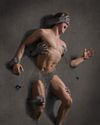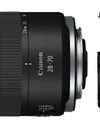
Canon has come a long way since launching the original Canon EOS R nearly four years ago. At the end of 2022, the R series was up to 11 camera bodies and 31 lenses, and after producing some of the best Canon cameras to date, from the flagship EOS R3 to the entry-level EOS R10, Canon is not slowing down with another two cameras (the R8 and R50) and two lenses added to the roster.
The latest EOS R camera from Canon is the EOS R8, which despite being named one numerical value above the APS-C-equipped Canon EOS R7, the R8 is actually sporting a full-frame sensor. Canon says the EOS R8 sits in its line-up between the Canon EOS RP, its entry-level full-frame camera, and the EOS R6 Mark II, for serious enthusiasts and professionals. And you can see how they have got there, the EOS R8 is a bit of a Frankenstein’s monster of the two, whether it is an upgraded Canon EOS RP, or it is a compromised EOS R6 Mark II.
In Canon’s DSLR system, the full-frame range doesn’t go any lower than the EOS 6D. However, Canon is showing a keenness with their mirrorless range to hit every form factor at a much wider range of price points. Originally causing some surprise with the announcement in 2019 of the EOS RP, undercutting rivals on price, although with some fairly significant concessions.
The Canon EOS R8 sits in the middle between the RP, which remains in the lineup for now, and the EOS R6 Mark II, offering some significant savings over the more advanced model.
Specs update
This story is from the Spring 2023 edition of PhotoPlus : The Canon Magazine.
Start your 7-day Magzter GOLD free trial to access thousands of curated premium stories, and 9,000+ magazines and newspapers.
Already a subscriber ? Sign In
This story is from the Spring 2023 edition of PhotoPlus : The Canon Magazine.
Start your 7-day Magzter GOLD free trial to access thousands of curated premium stories, and 9,000+ magazines and newspapers.
Already a subscriber? Sign In

The Art of Copying Art - James Paterson shows you how to use your Canon gear to capture artwork and paintings the right way with simple camera and lighting skills
Whether you want to capture a painting like the above, digitise old prints or reproduce any kind of canvas, there's real skill in capturing artwork with your camera. Not only do you need the colours to be accurate, you also need to master the spread, angle and quality of the light to minimise glare and show the work at its best.This painting by the artist Bryan Hanlon has a wonderfully subtle colour palette. To reproduce the painting in print and digital form, it needs to be captured in the right way.

Fright night
Canon photographer and digital artist Alexander loves to craft incredible fantasy scenes with a spooky horror twist

Sharpen your shots with DPP
Sharpening a digital image also increases contrast at the edge of details

CANON ImagePrograf PRO-1100
Deeper blacks, better bronzing, greater lifespan and 5G Wi-Fi -Canon's new printer is full of new tech, says

Canon's new 'kit lens' is actually a half-price f/2.8 trinity lens!
The Canon RF 28-70mm F2.8 IS STM lacks a red ring, but borrows premium features from its L-series siblings

DREW GIBSON
Pro motorsports photographer Drew on why he hasn't (yet) switched to Canon's mirrorless system, why old-school techniques can be the most reliable, and the lessons learned from more than a decade shooting the world's biggest car brands

Up in smoke
Make a smoky shape in Affinity Photo and get to grips with the amazing Liquify Persona under the guidance of James Paterson

Expand your creativity with Generative Fill
Photoshop's Al-powered feature brings revolutionary new tools to image editing. James Paterson reveals all...

Turn your images into vintage postcards
Wish you were here? Sean McCormack explains how you can give your summer photographs a vintage postcard look

The Angel Malibu
Light painting an American movie producer in the Wadi Rum Desert in Jordan was a highly unlikely evening out for David!